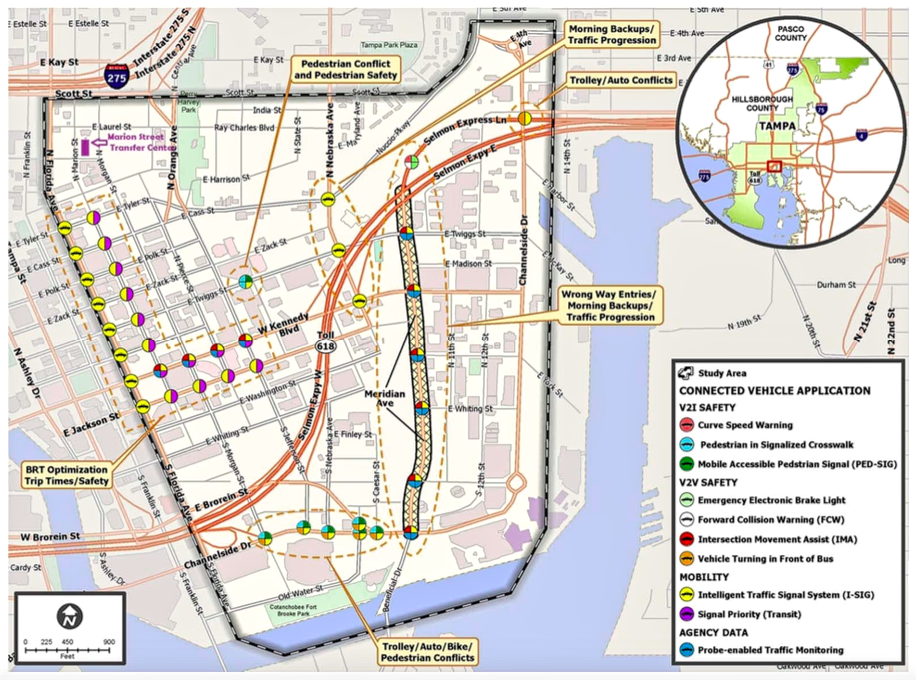Connecting state and local government leaders
“This is the next paradigm shift in transportation,” says one official helping to lead up the program.
A transportation agency in Tampa, Florida, is pressing forward with plans to deploy a broad set of so-called connected vehicle technologies, designed to improve traffic flows, and to warn drivers and pedestrians when they may be approaching dangerous situations.
Tampa was selected last year as one of three sites for the U.S. Department of Transportation’s Connected Vehicle Pilot Deployment Program, which was launched to spur innovation with emerging technologies that enable vehicles to communicate with one another and nearby infrastructure. New York City and Wyoming were the other two sites selected for the pilot.
Some overarching goals of the Tampa program will be to use the technologies that get tested to reduce congestion, prevent crashes and keep pedestrians safer.
The program calls for equipping about 1,500 personal vehicles with units that will enable drivers to get in-car warnings about oncoming hazards. The vehicles would also transmit data about variables like speed and braking to a traffic management center, offering real-time insight about road conditions. Buses and streetcars would be outfitted with similar technology.
Also envisioned is a smartphone application that would alert pedestrians if they are on the verge of getting struck by a vehicle while walking in the street.
Overseeing the program in the city is the Tampa Hillsborough Expressway Authority, THEA for short, an independent agency that owns, operates and maintains four roadways in Hillsborough County, where Tampa is located—a 15-mile toll road known as the Lee Roy Selmon Expressway, Brandon Parkway, Meridian Avenue and the Selmon Greenway.
“This is the next paradigm shift in transportation,” the authority’s planning director, Robert Frey, said as he discussed the pilot during a recent interview. “It is happening.”
Under a contract with the Federal Highway Administration, THEA will receive $17 million in federal funding for the pilot program and will provide about $3.8 million in local matching funds.
The authority is wrapping up its first year of planning for the pilot and will move toward a design and development phase this September. A significant part of the project, at this stage, is nailing down an evaluation plan, so the effects of the technologies that get deployed can be measured.
By March 2018, the piloted technology is expected to be up and running in the city.
‘An Active City Street’
With about 369,000 residents, Tampa is located on Florida’s Gulf coast, by a bay that shares the city’s name.
Much of the connected vehicle pilot will focus on a roughly one-mile stretch of Meridian Avenue, a busy north-south thoroughfare near the center of Tampa. Although it’s not the only street where technology will be tested, Frey characterized the avenue as being at the core of the pilot.
Reversible express lanes on the Selmon Expressway, a major artery for Tampa commuters, run directly into the avenue.
During morning rush hour, traffic flows west along the reversible lanes, into downtown. In the afternoon, the lanes are reversed, providing extra road capacity for drivers leaving Tampa.
At the north end of the targeted corridor is a sweeping curve, where the reversible lanes end and turn into Meridian. When morning rush hour traffic here streams toward the city’s street grid, backups can occur on the curve, raising the risk of rear-end collisions.
To the south, the pilot corridor is bounded by a street known as Channelside Drive. Near Channelside, there are a number of destinations that draw tourists and crowds, including the city’s cruise ship terminal, The Florida Aquarium, and the Amalie Arena, which serves as an event venue, and the home of the Tampa Bay Lightning National Hockey League team.
Mixed with the traffic traveling on Meridian and the surrounding streets are Hillsborough Area Regional Transit Authority buses. Tampa’s TECO streetcar line runs along Channelside.
Frey characterized Meridian as a roadway that is used heavily by vehicles, pedestrians, and cyclists and noted that there is also condominium housing along it. “It’s an active city street,” he said. “There’s a lot of interactions on there, and that’s one of the reasons we chose it.”
Proposed Deployments
Later this year, THEA will begin looking to recruit about 1,500 volunteers who are willing to have their personal vehicles equipped with communication devices as part of the pilot program. The devices will enable these vehicles to send and receive a wide variety of information.
Someone speeding into the curve at the north end of Meridian Avenue, for instance, could get an in-car warning letting them know to slow down because of upcoming congestion. Other examples of safety messages drivers might receive are warnings about hard braking ahead, that they’re at risk of having a collision with another motorist, or that they’re about to run a stop light.
Warnings like these would be possible because data about vehicles participating in the pilot program, such as speed, braking and location, would be flowing back and forth between those vehicles and roadside communication units in the test area.
These roadside units will rely on Dedicated Short Range Communications, or DSRC. This wireless communications technology is expected to provide a foundation for connected vehicle and infrastructure systems in the coming years.
Frey believes roughly 37 to 47 roadside DSRC units will be installed as part of the pilot. Engineering giant Siemens is overseeing this part of the program. While DSRC will provide a backbone for the technology used in Tampa’s pilot, Frey said other forms of communication technology could come into play as well, including Wi-Fi and even XM radio.

Ten Hillsborough Area Regional Transit Authority buses are also slated to have communications equipment installed. The equipment would allow them to get priority over other vehicles at traffic signals, increasing their odds of getting a green light, with the aim of cutting down on delays.
And streetcars are set to be outfitted so operators would get alerts when a vehicle is about to turn in front of them, or when a pedestrian might be headed into their path.
One element of the project still taking shape is the smartphone application for pedestrians.
“That one there is a little bit still on the drawing board,” Frey said. As originally conceived, the basic concept with the app was to allow pedestrians’ cellphones to communicate with vehicles, alerting drivers if they were about to hit a person in the street.
But it turned out that this would have created a cybersecurity risk, which could potentially be exploited by hackers, Frey explained. So instead, collision warnings for drivers and pedestrians will come from the roadside units that will be installed as part of the pilot program.
Using sensors, the units would be able to detect when a pedestrian is in the street, and to send a warning to the driver of a connected vehicle. Likewise, the roadside unit would be able to issue an alert to a pedestrian using the app on their phone, telling them they are at risk. A cellphone would be able to receive this type of message, but could not send anything back.
“Your phone would buzz or ring to tell you that you’re approaching a dangerous situation,” Frey said. Many pedestrians, he noted, have “their heads down in their cell phones. So we thought that maybe getting the information down there where they’re looking might work.”
The pilot program includes a number of other planned deployments as well, such as systems to adjust stoplight signal timing to improve traffic flows based on data from connected vehicles, and warnings meant to prevent wrong-way entries on expressway ramps.
Less Complex Than a Drug Trial
Evaluation is a crucial aspect of the pilot, according to Frey.
“That’s a bigger part of these pilot deployments than people think about, the ability to measure the effects that these types of treatments have on the road network,” he said. “Many people are getting so caught up in the actual technology,” Frey added. “Everything we’re using is already basically on the market. The pilot deployment is to see what it does.”
Responsibility for these evaluation efforts in Tampa will fall to a team with the Center for Urban Transportation Research, based at the University of South Florida.
“It’s probably less complex than, say, a drug trial,” Stephen Reich, director of transportation program evaluation and economic analysis at the center, said as he discussed the evaluation plan for the pilot in a recent interview.
The objective with the evaluation is to be able to determine to what extent the new technology actually achieves goals like making people safer, or roadways more efficient. To be able to say, for instance, someone is a certain percent less likely to have a wreck when driving a connected vehicle.
Travel times, on-schedule bus arrivals, crash rates, red light violations, and near-miss incidents, are the kinds of variables the evaluation team plans to assess.
Voluminous amounts of data are expected to flow from the connected vehicles, as well as the roadside DSRC units.
Some baseline data, like crash counts, already exists. Other information for comparisons will need to be collected prior to the new technology getting launched—including video to record how many people mistakenly head the wrong direction on expressway ramps, according to Frey.
The experimental designs to measure results will vary, Reich said.
Some vehicles with communications technology, for example, might get in-car curve speed alerts, while others would not. Examining the difference in how each group of drivers behaves could offer a window into how well the technology works to improve safety. “We hope we can minimize the timeframe that we need to do that to get statistically robust results, so that everybody can benefit,” Reich said. “Eventually everybody will get the alerts.”
The approach to measuring the effect of signal priorities for buses will have to be somewhat different, because all the buses involved in the pilot will have identical equipment. Researchers will have to use techniques like comparing performance along a bus route before and after the equipment is installed.
While he recognized previous evaluations of some individual technologies that will get tested in Tampa, Reich is “not sure that this menu of applications, and this large of a deployment in a real world situation has been done.” He added: “It’s a really unique opportunity.”
Bill Lucia is a Reporter for Government Executive’s Route Fifty and is based in Washington, D.C.

NEXT STORY: 4 Kansas Ex Governors Join Forces to Fight Sam Brownback’s Fiscal Policies




